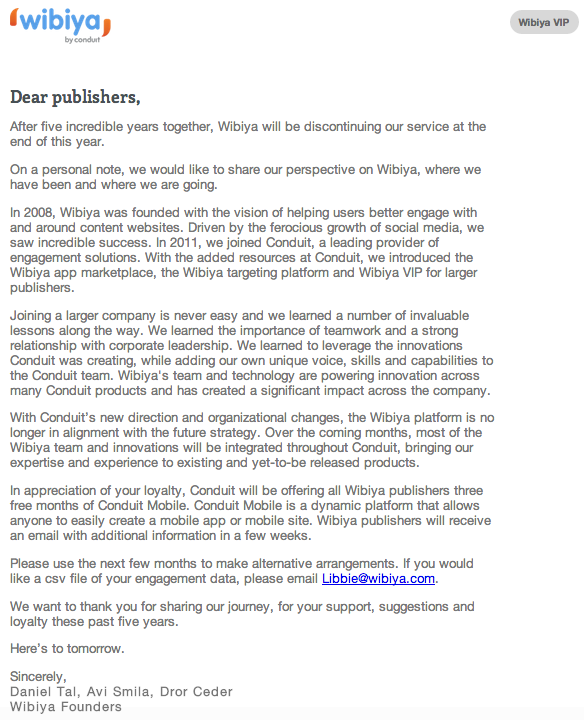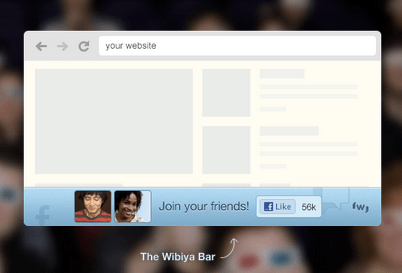Less than a month after browser-toolbar and mobile startup Conduit merged its Client Connect division with Perion, the company is making another change to its business. Conduit has announced that it will be discontinuing Wibiya, the social browser toolbar service that it acquired in 2011 for $45 million, as it shifts further away from its toolbar business.
In a letter mailed to customers that is living at this link — but which is not yet publicly accessible through the company’s actual site — Wibiya founders Daniel Tal, Avi Smila and Dror Ceder write that the company will be discontinuing its service by the end of the year.
“Most of” Wibiya’s team and some innovations will get integrated into other Conduit operations, they note. The letter has no explanation for why Conduit has chosen to streamline operations. “Joining a larger company is never easy,” they write, “and we learned a number of invaluable lessons along the way.” Conduit is offering Wibiya customers three months of Conduit Mobile, which costs $39/month.
But in an internal email that we have obtained, Ronen Shilo, the co-founder of Conduit who helped engineer the company’s reverse takeover of Perion in September, puts the decision down to a move away from toolbars in general — a change that Conduit is making in the wake of deciding to split the business, which it did back in July.
That split divided the company in two, with one part focusing on its mobile and engagement business and run by Shilo, and the other, Client Connect, merging with Perion. It was into Client Connect that Wibiya had gone, along with Conduit’s other toolbar business; together these merged with Perion brands like Incredimail (unified messaging app), Smilebox (photo sharing) and the SweetIM (an IM app). Client Connect is currently run by Josh Wine.
“As you know, the decision to separate the company reflects a newly focused objective for Conduit – including a shift in product strategy – which has implications beyond Client Connect. One of those is that maintaining Wibiya as a free-standing business no longer fits where we are headed,” Shilo notes. “We acquired Wibiya as a complementary solution for our toolbar business; they delivered publisher solutions within a site, while our toolbars did that outside the site. Now that the toolbar business is no longer a focus, it’s clear that Wibiya, as a business unit, lacks a strategic role for us.”
The Wibiya business enabled publishers to integrate toolbars on their websites that let users do things like share links on social networks; translate pages into different languages; or offer free apps, games and video galleries — all in the name of getting users to spend more time on the site.
Wibiya — an Israeli company founded in 2008 — was conspicuously absent from both $1.4 billion Conduit’s communications when it was splitting into two in July, and its reverse takeover of Perion in September. At the time of the Wibiya acquisition in 2011, we reported that its toolbars were on around 120,000 sites, reaching some 200 million unique users. Those numbers have grown, but not by much: It’s now used by some 150,000 publishers reaching some 285 million uniques.
It’s not exactly clear, but it may have been that this business simply was not generating meaningful enough revenue, or growing fast enough, for the company. It wouldn’t be the first toolbar to shut down after getting acquired. The same thing happened to website toolbar creator Meebo about a year after Google bought it.
Both Wibiya letters, to customers and to employees, are below.

Dear employees,
As you know, the decision to separate the company reflects a newly focused objective for Conduit – including a shift in product strategy – which has implications beyond Client Connect. One of those is that maintaining Wibiya as a free-standing business no longer fits where we are headed.
We acquired Wibiya as a complementary solution for our toolbar business; they delivered publisher solutions within a site, while our toolbars did that outside the site. Now that the toolbar business is no longer a focus, it’s clear that Wibiya, as a business unit, lacks a strategic role for us.
However, there is great technology, human experience and capabilities within Wibiya, and we’re in the process of integrating many of these into the existing Conduit businesses. This will enable us to use much of Wibiya’s technology and skills in our existing and planned products. Wibiya is comprised of a strong team of talented individuals from various disciplines and we look forward to finding them exciting positions within Conduit.
We will carefully and thoughtfully wind the brand down between now and the end of this year, as part of our overall preparation for life after the separation.
This decision has not been easy for Wibiya’s founders or myself but as always Dror, Daniel and Avi are true leaders and product visionaries and understand the current situation and where we’re headed. They will remain with us to ensure the process is successful and I personally intend to remain close to them, in active dialogue, as they figure out their plans.
I want to personally thank the Wibiya founders and employees for their contribution to Conduit and look forward to seeing their future efforts come to fruition, whether within Conduit or elsewhere.
Ronen
